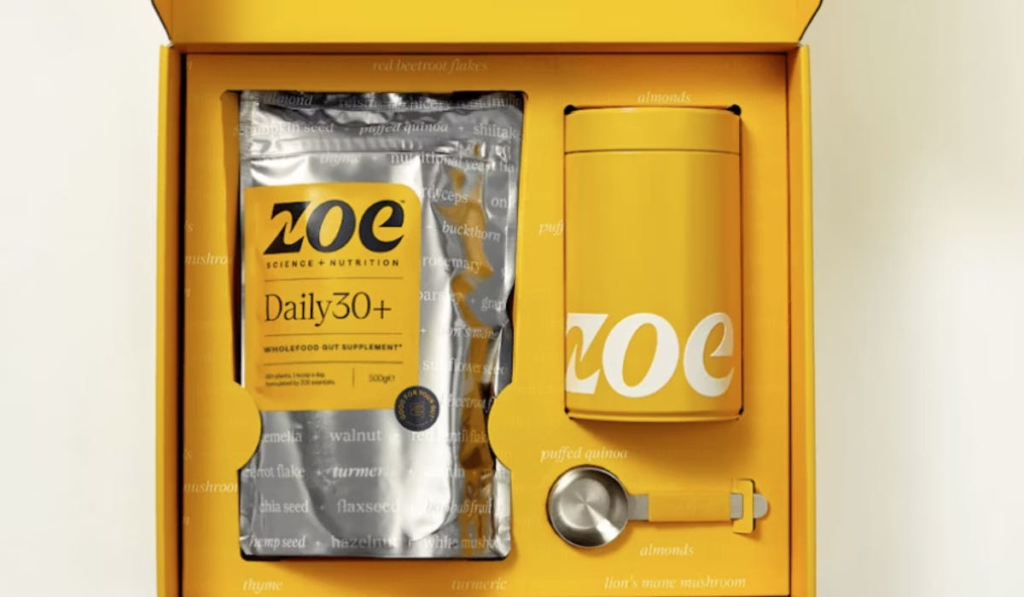Zoe co-founder Tim Spector calls the ruling “baffling” for inconsistencies around what is defined as an ultra-processed food, and is appealing the ruling.

The Advertising Standards Authority (ASA) has banned a Facebook ad by nutrition startup Zoe after it found the brand’s claim that its Daily30+ supplement was free from ultra-processed (UPF) ingredients was likely to “mislead” consumers.
The ad, posted in September 2024, promoted the “wholefood supplement” with an endorsement from entrepreneur Steven Bartlett that read: “This is a supplement revolution. No ultra-processed pills, no shakes, just real food.”
A nutrition professor raised a complaint that the ad implied the product contained no ultra-processed ingredients, and the ASA agreed.
It ruled two ingredients, chicory root inulin and nutritional yeast flakes, had undergone more than “minimal” processing making them UPFs – and meaning the product isn’t in line with what the average consumer would consider “real food”.
Steven Bartlett-fronted Huel and Zoe ads banned for not disclosing financial ties
While the ASA acknowledges the product doesn’t fall within the NOVA classification system – the legal framework for classifying food processing – for UPFs, it decided consumers would not be “aware” of the system.
The ruling states: “Because consumer perception of UPFs was not likely aligned with these classifications or definitions, we considered it was unlikely that consumers would be aware that the NOVA classification or other four scientific definitions of UPFs referred to the whole product rather than individual ingredients.”
Zoe strongly refutes the ad ban and is appealing it.
Zoe criticises ‘baffling’ ruling
In a statement, Zoe’s co-founder Professor Tim Spector, said: “We categorically reject the idea that this advert is misleading, or that Daily30+ – or any of its ingredients – could be classed as ultra-processed.
“The ad clearly states that Daily30+ doesn’t contain ultra-processed pills or shakes. That’s because it doesn’t. It is made entirely from whole food ingredients, and is designed to be added to meals – not taken as a pill or a shake. The claim is factually accurate and irrefutable,” he added.
Spector also said: “The ASA itself has already acknowledged that Daily30+ doesn’t meet the NOVA definition of UPFs. So this ruling is entirely baffling.”
This isn’t the first time a social media ad by Zoe has come under scrutiny by the ASA.
Last August, a Facebook ad featuring Bartlett was banned for not declaring his financial interest in the business as an investor.
It featured a quote from Bartlett stating: “If you haven’t tried Zoe yet, give it a shot. It might just change your life”.
Responding to the ASA, Zoe argued the average consumer would understand when a celebrity appeared in its advertising, that there is a commercial relationship.
Spector’s statement in full
“We categorically reject the idea that this advert is misleading, or that Daily30+ – or any of its ingredients – could be classed as ultra-processed. The ad clearly states that Daily30+ doesn’t contain ultra-processed pills or shakes. That’s because it doesn’t. It is made entirely from whole food ingredients, and is designed to be added to meals – not taken as a pill or a shake. The claim is factually accurate and irrefutable.
Let’s be clear: the ASA itself has already acknowledged that Daily30+ doesn’t meet the NOVA definition of UPFs. So this ruling is entirely baffling.
The two ingredients in question – chicory root inulin and nutritional yeast flakes – are neither harmful nor considered ultra-processed. Chicory root inulin is high in fibre, backed by health claims from the EFSA and FSA and is a well-researched, well-understood ingredient added to improve the nutritional profile of many foods and used in clinical practice. Nutritional yeast is a nutrient-dense powerhouse, full of B-vitamins, minerals and protein and used as a culinary ingredient recommended to improve dietary intakes of micronutrients and healthy protein.
We see no scientific basis for the ASA’s conclusion – and it risks misleading the public at a time when clarity around healthy eating is more important than ever.
We are deeply committed to improving health through healthy food and evidence-based nutrition education. Zoe’s randomised controlled trial on Daily30+ clearly shows its positive impact on health. Censoring our advert, which encourages increasing consumption of fibre, is counter to public health.
We fully stand by Daily30+’s integrity, its health benefits for consumers, and our expertise in nutrition science and improving public health. To go after a product that is designed to improve health whilst doing very little about the harmful marketing and advertising of unhealthy junk food to children and vulnerable individuals is nothing short of disgraceful.
This ruling only adds to the confusion in a food system already plagued by misleading information.”


